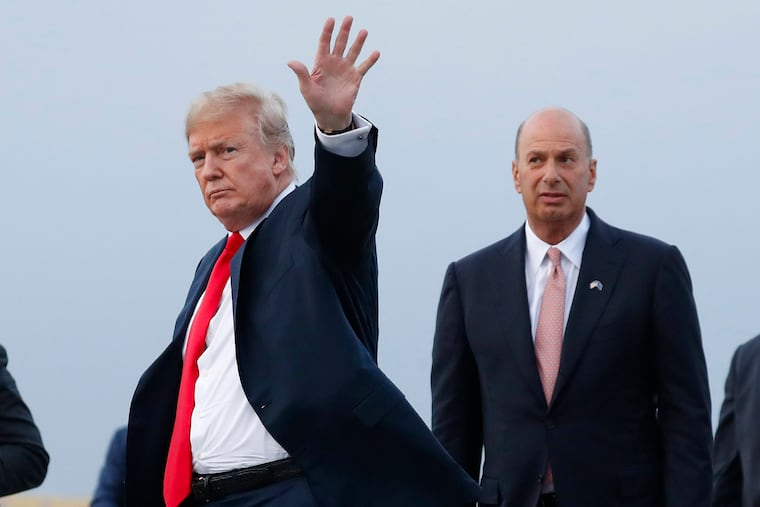There is nothing wrong with quid pro quos. It just depends what the quo is. | Marc Thiessen
It all depends what the President's "quo" was in his Ukraine dealings.

WASHINGTON — It’s Washington’s new favorite Latin phrase: quid pro quo. On Capitol Hill, Democrats seeking to impeach the president are trying to prove that he engaged in a quid pro quo (“this for that”) with U.S. aid to Ukraine. The president has insisted “there was no quid pro quo.” But then last week, White House acting chief of staff Mick Mulvaney seemed to admit to a quid pro quo during his hapless news conference.
It seems as though the fate of the Trump presidency hangs on those three Latin words. Find proof of a quid pro quo and Trump is a goner.
But that's not exactly true. The United States engages in quid pro quos all the time when it comes to foreign assistance. Our aid is not charity; Americans expect to get something in return for it. We have leveraged U.S. assistance in exchange for a host of objectives: economic reform, democratic reform, better pursuit of corruption, access to strategically important areas and so on.
In 1978, Jimmy Carter agreed to provide Egypt with billions of dollars in foreign aid in exchange for making peace with Israel, as part of the Camp David Accords. That was a quid pro quo. In 2004, George W. Bush created the Millennium Challenge Account, which required countries to meet a host of eligibility requirements — free speech, free assembly, rule of law, property rights, transparency — before they could receive a grant of aid. That program was one big quid pro quo.
Congress imposes quid pro quos on U.S. foreign aid all the time, as well. Democrats howled when Trump cut aid to Central America earlier this year, but as Lester Munson, former staff director of the Senate Foreign Relations Committee, points out, "If you look at the appropriations bill that actually provided the president with the money to give assistance to Central America, there are 15 different reasons you might suspend the aid there."
Even former vice president Joe Biden has admitted to a quid pro quo with Ukraine. He held up $1 billion in loan guarantees (a quid) to get them to fire a prosecutor who was not investigating corruption (a quo). This was perfectly legitimate, he says, and he may well be right.
So, there is nothing intrinsically wrong with quid pro quos. It just depends what the quo is.
In his news conference, Mulvaney said “the money held up had absolutely nothing to do with Biden.” Good, because holding up U.S. aid as a quid pro quo for investigating the president’s political rival would be highly problematic. Rather, Mulvaney said, it was based on three issues: first, concerns about corruption in Ukraine; second, concerns about burden-sharing by our European allies in supporting Ukraine; and third, “whether they were cooperating in an ongoing investigation with our Department of Justice” into the origins of the Mueller probe that is being led by U.S. Attorney John H. Durham, a career prosecutor. It was the third — conditioning aid on the Durham investigation — that prompted Democrats to say: Gotcha!
» READ MORE: ‘Absolutely, this harms Ukraine’: Prominent NGO official in Kiev talks about Trump shakedown | Trudy Rubin
Mulvaney later said he misspoke, and that's probably true. As Kurt Volker, the former U.S. envoy to Ukraine, explained in his sworn deposition before the House Intelligence Committee, the Ukrainians did not know that the aid was being held up until more than up a month after Trump's phone call with Ukrainian President Volodymyr Zelensky (during which Trump never mentioned the aid was on hold). "They became aware later [that the aid was held up], but I don't believe they were aware at the time, so there was no leverage implied," Volker told the committee. If you are demanding a quid pro quo, you have to tell the country that you are holding up the quid until they deliver the quo. The Ukrainians didn't even know there was a quid.
But let's say Trump had in fact withheld U.S. aid to get Ukraine to cooperate with the Durham probe. There would be absolutely nothing wrong with that. The president, as the country's chief law enforcement officer, would be entirely within his rights to use aid as leverage to get Ukraine cooperate with an official Justice Department investigation. If it turns out that the quo was "investigate my 2020 opponent," as Ambassador William Taylor reportedly alleged during testimony on Capitol Hill Tuesday, then Trump is in big trouble; but if the quo is "cooperate with the Justice Department," that's perfectly fine.
So, while Democrats may be insisting that Trump delenda est — “Trump must be destroyed” — they will need something more than this quid pro quo to do it.